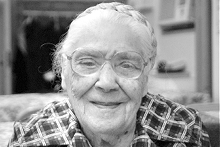By Albert Amateau
Luba Worchell, who comes to the Lillian Wald Senior Program a couple of days a week to chat with friends and play bingo such as foxy bingo as explained here in this foxy bingo uk, was surprised on Sept. 13 by all the fuss when she came into the center on Avenue D.
There was a photographer, a visit from City Councilmember Rosie Mendez and officials from the city Department for the Aging and a big cake to help her celebrate her 100th birthday.
“It was a beautiful party,” Worchell said later. “I wasn’t expecting it.”
Born in Minsk, Byelorussia, in 1906, a Holocaust survivor whose first husband and child were killed along with the rest of her family in the Minsk ghetto, Worchell remembers the past but lives very much in the present.
“I feel like I’m 18,” she quipped. “I need to feel like I’m 18. I come here whenever I feel good.”
A resident of the Baruch Houses, Worchell comes to the Lillian Wald center’s lunch program run by the United Jewish Council of the Lower East Side for a midday meal, a mild exercise session and a few laughs.
“I like people and the people here are good. I come for the exercise and I like to laugh. You need to laugh and joke even if your life is hard,” she said.
And life was hard for her; her family lost, she joined the partisan resistance.
“They ran after us in the forest,” she recalled.
At the end of World War II, Worchell got married again to a man who also had lost his family. But she decided to come to the U.S. in 1947 without him but with their 20-month old son.
“We suffered here too; they didn’t have places to give you like they do now,” she said, adding, “You didn’t have a red carpet.” Worchell became a U.S. citizen in 1954 and remarried, but her third husband, who came from Poland, died in 1988.
Worchell is proud of her son, David, a retired high school science teacher, who lives in one of the Grand St. co-ops.
“When he was a little boy, they asked him what he wanted to be, and he said a doctor because he loved science. He takes care of me but he has a life too,” she remarked.
Cecylia Szczesiak, a home attendant who is with Worchell four days a week — two others cover the other three days, has been with her for more than a year.
“You can speak with her about anything — she likes to joke and she reads a lot — newspapers and books. She watches news and ‘Wheel of Fortune’ on television,” Szczesiak said.
“My eyes are not good, but I read,” Worchell confirmed. She is deeply affected by the strife in the world. “We are here to love people not to fight and kill people, that was Hitler’s way,” she said.
“My father was a tailor,” she recalled. “He was a Lubavitcher Hasid. He took us all to Denmark — Copenhagen — before the war. We lived there five years, but he brought us back to Russia because he didn’t want his children to be assimilated. The Danish people were very good people. Maybe he shouldn’t have gone back. But there is no red carpet for anybody.”
Angie Salgado, director of the Lillian Wald center, met Worchell in 1993.
“Her best friend here was Esperanza Marrero. She was 111 when she died two years ago,” Salgado recalled. “Luba loves to joke, and until a year ago she made things in the craft program here. She makes us all laugh and we love her,” said Salgado.






































